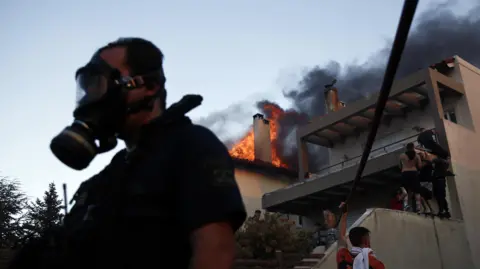Greece is currently grappling with a series of devastating wildfires, particularly in areas near Athens. Emergency services have been activated to evacuate residents from regions most impacted by the fires, which are wreaking havoc just 30 kilometers (approximately 18.6 miles) north of the capital. This dire situation has led to a request for assistance from the European Union as officials strive to combat the spreading flames that threaten not only human lives but also property and the environment.
The country is engulfed in a severe heatwave, with temperatures soaring as high as 44°C (111°F) predicted for the upcoming Sunday. These extreme weather conditions have exacerbated the spread of the wildfires. According to Greece’s Minister of Climate Crisis and Civil Protection, Giannis Kefalogiannis, the scale of the crisis is alarming, with reports of injured firefighters and significant destruction to homes and forested areas.
Tensions escalate as high winds, coupled with scorching temperatures, have created an environment ripe for wildfires to thrive. The government has requested the EU Civil Protection Mechanism to provide additional firefighting aircraft to aid local efforts. In particular, the flames in the Attica region have been challenging to control. A fire that ignited in Afidnes quickly spread to nearby areas such as Drosopigi, Kryoneri, and Agios Stefanos, forcing mass evacuations.
Although the fire service has claimed containment of the main front, numerous hotspots continue to flare up, necessitating the deployment of over 200 firefighters, as well as aerial assistance from helicopters and water-bombing aircraft. The situation on the island of Evia is equally concerning, where another fire has spiraled out of control and is advancing towards the village of Afrati, with several surrounding villages like Pournos and Mistros losing electric power due to destruction of pylons and power lines.
As the wildfires rage, the toll on first responders has been significant; six firefighters suffered injuries from burns and smoke inhalation, highlighting the hazardous conditions they face. The mayor of Dirfyon-Messapion, Giorgos Psathas, described the destruction as incalculable, underscoring the dangerous landscape presented by the ongoing fires.
In addition to the situation near Athens, a third wildfire is engulfing the island of Kythira, leading to scenes described as “total destruction.” Emergency evacuations have occurred, notably at Limnionas beach, where the coastguard and private vessels successfully rescued 139 individuals and transported them to safety at Kapsali port.
On the mainland, Messinia faces a fourth wildfire in the Polithea area of Trifylia, which intensified throughout Saturday. The Greek emergency system, known as 112, has issued five alerts urging residents in vulnerable villages to evacuate. Firefighting operations are hampered by strong winds, with 84 firefighters, 30 vehicles, and seven aircraft deployed in the firefighting efforts.
Meanwhile, in Crete’s Chania region, the fifth wildfire has erupted in Temenia, where it started in two separate locations and quickly consumed at least two homes. As if these fires were not enough, multiple regions of Greece remain under close watch for additional fire threats, including the Ionian Islands, Western Greece, and the Peloponnese.
In recent history, Greece’s struggle with wildfires has not been new; for instance, last month, fires on Chios, the nation’s fifth-largest island, decimated 4,700 hectares (roughly 11,600 acres) of land, illustrating the ongoing challenges the nation faces regarding wildfires. In early July, the island of Crete also experienced a significant wildfire that necessitated the evacuation of over 5,000 tourists.
As Greece continues to contend with these challenging conditions, the dedication and resilience of firefighters and emergency responders remain a crucial element in the fight against the raging flames threatening the country’s lands and lives.












